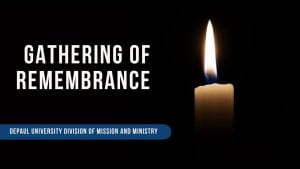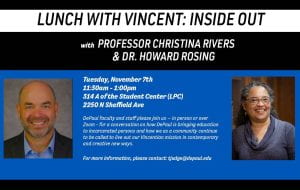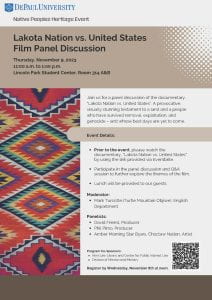
Have you ever had this question floating around in your mind during an encounter with another person:
How can I possibly prioritize the person in front of me, when … (you fill in the blank)
… I have so much to do and am already overwhelmed with many other things?
… I’m already late for my next appointment?
… I have a task to complete in meeting an imminent deadline?
… this encounter doesn’t feel as important to me as other things I feel I have to do?
Perhaps such a situation has occurred with a student, with a colleague, or with a person passing on the street. Maybe it’s during the workday on the way to or from a meeting, before or after a class … or maybe a similar situation will occur during an upcoming family holiday event!? I know that many times I have struggled with these types of situations. (And, as a theologian, I might add so were the priest and the Levite in the parable of the Good Samaritan!)
Over and over in my life and work, I continue to re-learn that putting people first may require letting go of my compulsive drive to achieve more, to fast-forward past the present to some ideal future, or to follow some other metric of “success.”
There are many reasons why being present to the person before us can seem difficult or less important than some other tasks we feel must be completed urgently. This hypothetical example may seem quite trivial in relation to the many larger challenges we face. Yet, being present to the other, for the other, and with the other may be the most foundational building block of creating a workplace and a student experience where people feel recognized, valued, and joyful. This is Vincentian personalism in practice, and sometimes it can mess with our plans and timetables.
The way in which we are present to one another has a significant impact on the kind of community we are and thus to our institutional ethos. It impacts the felt experience people have within the DePaul community, whether they feel seen and cared for, and perhaps whether or not they thrive.
Vincent de Paul’s spirituality was what Catholic Christians speak of as “incarnational.” That is, he believed that faith is ultimately made evident in concrete action. Vincent spoke often of virtues, which are essentially the consistent embodiment of our aspirational values. He was skeptical of abstract ideals that did not find their way into lived practice. In fact, what he most revered in the person and life example of Jesus was that Jesus incarnated the presence and love of God. Vincent believed we are called to do the same. Furthermore, he suggested, Providence accompanies us in the process, helping us toward the realization of the mission entrusted to us.
As an institution bearing Vincent de Paul’s name, we are challenged to prioritize people. In our mission statement and in how we go about our life together, we strive to value and affirm the sacred dignity of all in concrete ways. Therefore, the encounters, actions, and decisions that unfold in our life, work, and study are inherently meaningful. Each is an opportunity to put what we most value into practice. Each is an opportunity put people at the center, especially those who may be impacted by our way of being together, our decisions, and our actions. Each can help us to remember that ultimately our work is contributing to a community and society that helps all people thrive.
We are not perfect. Sometimes we fall short. We’re not always ready for the situation. Sometimes our personal habits, practices, or leadership styles must be adapted to better make care for one another possible. Sometimes we lose sight of what’s most important. Or, it may be that some institutional policies, procedures, job descriptions, or goals need to be critically examined and adapted to better enable such care.
Whatever it may be, our Vincentian mission calls us to make the accompaniment and support of people the heart of what we do and how we do it.
Clearly, we will continue to earnestly strive for larger and very important goals, such as greater justice and equity in our society and world, the sustainability of our planet, an end to violence, and the alleviation of poverty. These remain our end goals and larger vision. Yet perhaps what we manage best along the way, amid our daily journey, is that next encounter with the person before us or that next action that may impact other human beings in our care. In these situations, and in your approach to your life and work at DePaul, how do you—how do we—put people first? As an educational institution, isn’t that what we are most about in the end?
Reflection by: Mark Laboe, Associate VP for Mission and Ministry



 Winter Clothing and Blanket Drive
Winter Clothing and Blanket Drive Day with Vincent Retreat: Save the Date
Day with Vincent Retreat: Save the Date
 Rommie Khalifeh, the son of faculty member Jumana Khalifeh of the College of Liberal Arts and Social Sciences, Sociology, passed away on October 30, 2023 at the age of 29. He is survived by his parents, Bassam and Jumana, siblings Rana and Jenna. Rommie graduated from DePaul in 2016 with a Bachelor’s degree in Accounting and completed Law School at UIC in 2019. Services were held on November 5 at Donnellan Family Funeral Home.
Rommie Khalifeh, the son of faculty member Jumana Khalifeh of the College of Liberal Arts and Social Sciences, Sociology, passed away on October 30, 2023 at the age of 29. He is survived by his parents, Bassam and Jumana, siblings Rana and Jenna. Rommie graduated from DePaul in 2016 with a Bachelor’s degree in Accounting and completed Law School at UIC in 2019. Services were held on November 5 at Donnellan Family Funeral Home.








